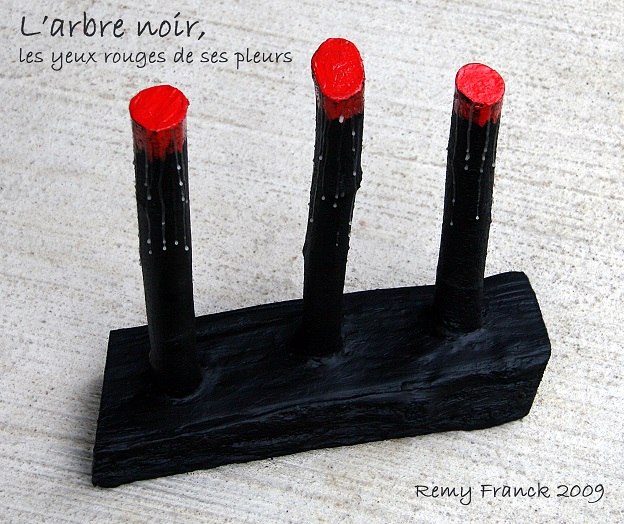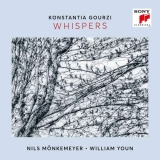Auf dieser CD sind nur Ersteinspielungen von Werken zu hören, die Konstantia Gourzi für den Bratschisten Nils Mönkemeyer und den Pianisten William Youn geschrieben hat. Das ganze Programm hat einen Bezug zur Natur, denn Konstantia Gourzi schreibt im Booklet, jedes der sechs Stücke sei ein musikalisches Gedicht an die Natur. Das erste davon, Wind Whispers, ist ein eigentlich sehr einfaches, aber umso stimmungsvolleres Solostück für Klavier, das William Youn zauberhaft ‘flüstert’. Das zweite Stück ist ähnlich ‘leise’, Evening at the Window II. für Solobratsche, präpariertes Klavier und kleine Schlagzeuginstrumente.
Etwas lebendiger geht es in Call of the Bees zu. Im ersten Satz hört man die Bienen ganz busy hin und her fliegen und auch wie sie sich zwischendurch auf eine Blüte setzen, aber eigentlich soll es darum gehen, was Bienen wohl über die menschliche Entwicklung denken, und das drücken der zweite und dritter Satz mit dunklen Gedanken aus, für die Youn am Klavier zuständig ist, während Mönkemeyer seine Bratsche in höchsten Lagen und manchmal am Rande des Hörbaren klagen lässt.
Wenn Bäume reden könnten… Konstantia lässt sie reden, sich austauschen in dem Stück Messages Between Trees für Bratsche und Bordun, also einem sogenannten Brummbass. Die Botschaften, die Gourzis Bäume verbreiten, sind verhalten und kontemplativ. Ich hätte mir eher erwartet, die Bäume würden weinen… so wie in einer Holzskulptur, die ich 2099 kreierte.
 Doch Gourzi ist nicht so negativ, das nächste Stück, das wunderschöne Love Song für Viola und Klavier ist sogar ausgesprochen heiter. Aber die die CD beendenden Melodies from the Sea bleiben bis auf wenige Minuten ein ruhiges Stück, das Nils Mönkemeyer, William Youn und die Komponistin am kleinen Schlagzeug sehr nachdenklich spielen. Andere Komponisten haben das Meer dramatischer in Szene gesetzt.
Doch Gourzi ist nicht so negativ, das nächste Stück, das wunderschöne Love Song für Viola und Klavier ist sogar ausgesprochen heiter. Aber die die CD beendenden Melodies from the Sea bleiben bis auf wenige Minuten ein ruhiges Stück, das Nils Mönkemeyer, William Youn und die Komponistin am kleinen Schlagzeug sehr nachdenklich spielen. Andere Komponisten haben das Meer dramatischer in Szene gesetzt.
Und so ist Konstantia Gourzis Begegnung mit der Natur eine beschauliche. Aber ist es nicht genau das, was uns die Natur lehrt: Ruhe zu suchen und sich selbst wieder zu finden in eben dieser Natur. Und, so gesehen, ist Gourzis Naturmusik eine Art Rückzugsort, ein Ort, wo man sich weit entfernt vom alltäglichen Lärm regenerieren kann.
This CD features only premiere recordings of works written by Konstantia Gourzi for violist Nils Mönkemeyer and pianist William Youn.
The entire program has a connection to nature, as Konstantia Gourzi writes in the booklet that each of the six pieces is a musical poem to nature. The first of these, Wind Whispers, is actually a very simple but all the more atmospheric solo piece for piano, which William Youn ‘whispers’ enchantingly. The second piece is similarly ‘quiet’, Evening at the Window II. for solo viola, prepared piano and small percussion instruments.
A bit more lively is Call of the Bees, a piece in whose first movement you can hear the bees flying back and forth quite busy, to sit down on a flower in between, but actually it is supposed to be about what bees might think about human development, and this is expressed in the second and third movements with dark thoughts, for which Youn is responsible on the piano, while Mönkemeyer lets his viola complain in the highest registers and sometimes at the edge of the audible.
If trees could talk… Konstantia Gourzi lets them talk, exchange in the piece Messages Between Trees for viola and drone, i.e. a so-called hum bass. The messages that Gourzi’s trees spread are restrained and contemplative. I would have rather expected the trees to cry… as in a wooden sculpture I created in 2099.
But Gourzi is not so negative; in fact, the next piece, the beautiful Love Song for viola and piano, is downright joyful. But then again, the Melodies from the Sea remain a quiet piece except for a few minutes, played very thoughtfully by Nils Mönkemeyer, William Youn and the composer on small percussion. Other composers have staged the sea more dramatically.
And so Konstantia Gourzi’s encounter with nature is a contemplative one. But isn’t that exactly what nature teaches us: to seek tranquility and to find ourselves again in this very nature. And, seen in this light, Gourzi’s nature music is a kind of retreat, a place where one can regenerate far away from the everyday noise.
























